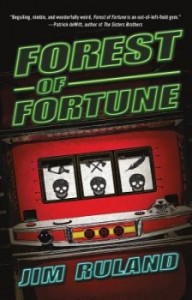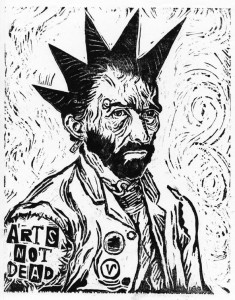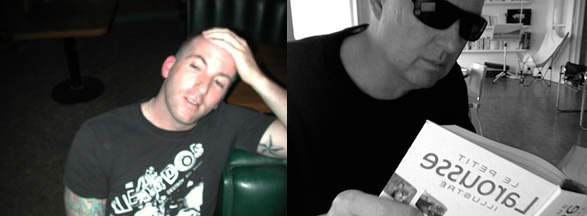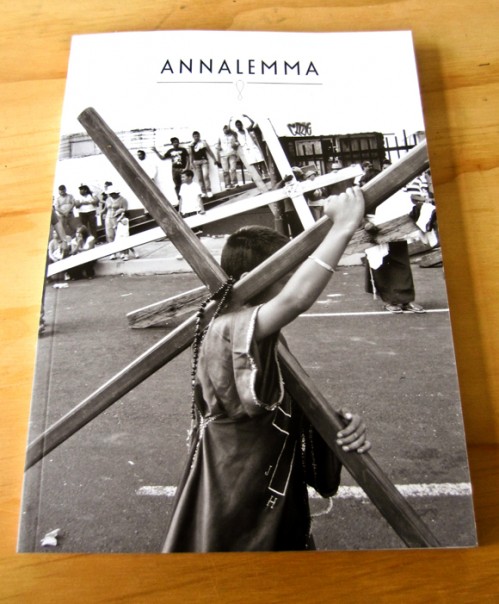Easy To Get Here, Hard to Leave
 Forest of Fortune
Forest of Fortune
by Jim Ruland
Tyrus Books, July 2014
288 pages / $24.99 Buy from Amazon
In his 1998 documentary Advertising and the End of the World, Sut Jhally defines culture as the stories we tell ourselves about ourselves. He further points out that the primary storytellers in our culture—the ones who have the most prominent voice in articulating our value and belief systems—are advertisers. It’s an elegant point, so seemingly simple that its depth can be lost without a few moments to meditate on it.
Most discussions of advertising itself in our culture are limited to the question, “Did that particular advertisement inspire me to purchase that particular commodity?” It’s a feckless question. Jhally notes that the answer to it may be relevant for the people selling the commodity, but it has little relevance to everyone else. Instead, we should be asking ourselves, “What’s the deep-seeded impact of the overwhelming wave of advertising that crashes on us every day?”
What we, as readers and/or writers of novels, don’t discuss much is the relationship of our medium to advertising. Novels are the one contemporary media that is not and can not be saturated with ads. (At least that’s true for the paper ones.) This is one of the reasons I read so many novels. This also leads to one of the great challenges for novelists: to wedge their little story into a culture besieged by several thousand daily advertisements.
Jim Ruland’s recent novel Forest of Fortune is one of those little stories consciously wedging itself into the conversation about advertising. It treads upon similar ground as Jhally’s documentary, yet does so in a tone that allows the reader a bit more freedom in her interpretations. Jhally’s tone is clear from it’s very title: Advertising and the End of the World. Nothing spells doom like that. Ruland also demonstrates his approach early, but in a much more subtle fashion. One of his protagonists, Pemberton, checks into a rundown motel with weekly and monthly rates below the forty-dollar nightly rate. The clerk gives him a sales pitch about one of the rooms. Pemberton is hyper-aware of what’s going on. “A copywriter by trade, [he] knew brochure copy when he heard it, yet was seduced all the same.”
Again, it’s a simple, elegant way of introducing a deep point. Pemberton’s reaction matches a very common one in our culture. We’re often seduced by advertising, untroubled by the knowledge that we’re being lied to, uncritical of the alternate reality it sells. We want the story regardless. In almost every case, it’s the story we purchase. The commodity is just the bi-product, something we’ll keep around until the story loses its luster.
The setting of novel further illustrates this relationship with advertising and consumer commodity culture. It takes place in a fictional California town called Falls City. The name is probably more literary play then heavy handed symbolism. Pemberton arrives there and thinks, “False City, indeed.” It’s a fun way of sending a reader away from the falsity promised by the more specific setting of the novel, Falls City’s Thunderclap Casino.
August 25th, 2014 / 10:00 am
Art’s not dead.

Punk Van Gogh image by your friend and mine, Jim Ruland.
Want that on a t-shirt? Beginning tonight at 9pm, you can order it from TeeFury. 24 hours later, a new design will take its place and you will be the only HTML Giant reader/contributor/or commenter without one. And then we will all point at you and laugh. Point and laugh at first, and then possibly talk about you when you leave.
Because we are HTML Giant. And we are totally clique-y. And mean to outsiders. And insular. And hip. Really very hip. It’s rad being us.
Want a song? Looks like you could use a song. Here, have a song:
READ MORE >
ANNALEMMA SIX: IT’S GOOD
I just got finished with Annalemma Six (with the Sacrifice theme), which just came out. It’s fucking awesome, and not just because it features Giant familiars like Roxane Gay, Ryan Call, Jimmy “the gangbang took place in Unit #209” Chen, J.A. Tyler, Brandi Wells, and others.
May 26th, 2010 / 3:07 pm
Vermin on the Mount host and Jean-Philippe Toussaint interviewer Jim Ruland is going to write for nine straight hours for the benefit of San Diego Writers. A great writer and a good cause. Also, free t-shirt!
A Conversation with Jean-Philippe Toussaint

My friend (and yours) Jim Ruland had a chance to speak to Jean-Philippe Toussaint recently, and sent this interview. I was going to run it on Hobart, but the schedule didn’t allow for it to appear in a timely manner there. Instead, we are cross posting it here at HTML Giant and on Hobart’s lovely blog to get the interview as much attention as we can.
Jean-Philippe Toussaint is the author of nine novels. Originally, published in France, the slender books have secured the Belgian author a reputation as a stylist who favors impressions over plot, comic situations over character development. Since 2007, Dalkey Archive Press has been publishing Toussaint’s work in English, trickling out two or three novels a year to a growing audience of eager enthusiasts for the quirky little books.
The most recent novel, Self-Portrait Abroad, released earlier this month, features a Belgian author traveling to cities in Europe and Asia. A sensual train trip to Prague, a visit to a strip joint in Nara, a victory in a lawn bowling tournament in Cap Corse are described in Toussaint’s quintessential style. READ MORE >
Jim Ruland wrote a great open letter to Matthew Simmons about A Jello Horse at The Believer. It starts:
Dear Matthew Simmons,
I am writing today to ask you a question about your book, which I read with great pleasure: what is it?

